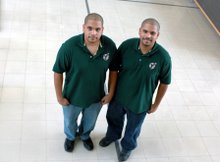By Vivienne Walt of TIME
Sunday, Nov. 23, 2008
Tenant farming was popular in rural America until the Dust Bowl years of the Depression, but the practice is making a comeback on an epic scale in much of Africa. This time, however, the "tenants" are not simply family farmers down on their luck and willing to work land they don't own; they're major international corporations and governments looking to compensate for shortages of arable land in their own countries by setting up massive industrial farms abroad. South Korea's Daewoo Logistics this week announced it had negotiated a 99-year lease on some 3.2 million acres of farmland on the dirt-poor tropical island of Madagascar, off southern Africa's Indian Ocean coast. That's nearly half of Madagascar's arable land, according to the U.N.'s Food and Agricultural Organization, and Daewoo plans to put about three quarters of it under corn. The remainder will be used to produce palm oil — a key commodity for the global biofuels market.
A Daewoo manager, Hong Jong-wan, told the Financial Times that the crops would "ensure our food security," and would use "totally undeveloped land which had been left untouched." Land is scarce and expensive in South Korea, which makes it the world's third-largest importer of corn. Daewoo says the Madagascar land will be leased for a price of around $12 an acre, which is a fraction of the price for farmland in the corporation's home country.
Not everyone is convinced that Daewoo's move is the most effective way of promoting food security. Riots have shaken dozens of countries across the world over the past year as poor people have found themselves unable to pay the rocketing prices for staples such as rice, corn and sugar. The U.N.'s World Food Program runs school-feeding schemes for children in Madagascar, where about 70% of the country's 20 million people live below the poverty line. The island's residents also rely on WFP emergency food relief programs because of the frequency with which they're struck by cyclones and droughts. Given those hardships, the prospect of a corporate giant growing hundreds of tons of food to be consumed by people and animals in Korea raises "ethical concerns," says David Hallam, head of the FAO'S Trade Policy Service in Rome. "If we have another world food crisis, and you have a poor country where food is produced by foreign investors, and then repatriated, that is ethically and political tricky," Hallam warns.
Those ethical quandaries have not prompted restraint on the part of other outside investors moving into Africa to exploit its agricultural potential. Several European companies have leased land during the past two years to grow crops for food and biofuels (although on a far smaller scale than Daewoo plans in Madagascar) including the British company Sun Biofuels, which is planting biofuel crops in Ethiopia, Mozambique and Tanzania.
Africa's fertile soil certainly appeals to the countries of the oil-rich Persian Gulf, whose vast deserts force them to import most of their food. "The Gulf states have an incredible surplus to invest and now that the old economies are facing recession they are looking at Africa," says Marie Bos, an analyst at the Gulf Research Center in Dubai. Although such wealthy countries as South Korea and the Gulf states are easily able to pay for food imports, this turmoil on global food markets may have increased the incentive for food-importing countries to secure their own sources of supply.
"[Food-importing countries] have lost trust in trade because of the price crisis this year," says Joachim von Braun, director of the International Policy Food Research Institute in Washington.
For African governments, the incentive to sign deals such as the one between Madagascar and Daewoo is equally clear. Millions of African farmers lack money for fertilizer, basic tools, fuel and transport infrastructure to efficiently grow crops get them to market. While international organizations have plowed billions into health and education, agriculture in Africa has lagged badly, hugely exacerbating the food crisis of the past year. "These governments are desperate to get capital into agriculture," says von Braun, who believes the drive by giant companies to lock up land deals could benefit poor African countries whose governments negotiate wisely. Although Daewoo plans to export the yield of the land it is leasing in Madagascar, it plans to invest about $6 billion over the next 20 years to build the port facilities, roads, power-plants and irrigation systems necessary to support its agribusiness there, and that will create jobs thousands of jobs for Madagascar's unemployed. Jobs will help the people of Madagascar earn the money to buy their own food — even if it is imported.
Sunday, November 23, 2008
Subscribe to:
Post Comments (Atom)




No comments:
Post a Comment